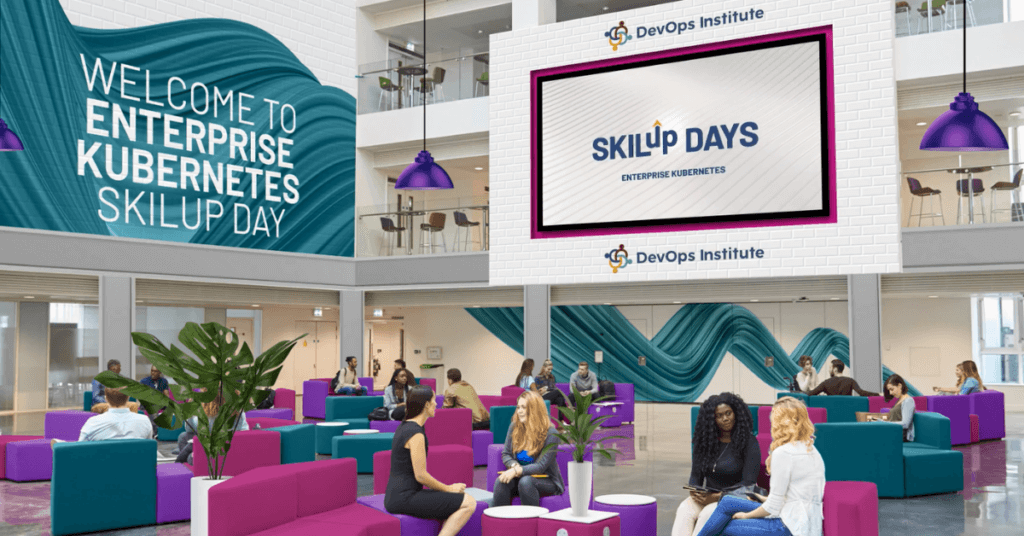
SKILup Day: Enterprise Kubernetes
SKILup Day: Enterprise Kubernetes was held on March 17, 2022. The one-day virtual conference featured “how-to” lessons and insight from speakers Colin Fallwell, Joel Kruger, Ankur Kumar, Yannick Lecroart, Saad Malik, Bill Manning, Frank Murphy, Layla Mullins, Turja Narayan Chaudhuri, Hatem Odeh, Daniel Oh, Amir Rawdat, Casey Rosenthal, Shauli Rozen, Ryan Sheldrake and Mustafa Toroman.
In addition to a full day of sessions, the event offered yoga, a scavenger hunt, session chats, sponsor hall and even a DevOps-inspired mixology class!
If you missed the Enterprise Kubernetes SKILup Day, never fear! We’ve got you covered with a quick round-up of the top themes from the sessions and conversations around this incredibly important topic.
Why Devote a Full Day of Learning to Enterprise Kubernetes?
It was only a few years since we started talking about the need for container orchestration. According to the Linux Foundation, 92% of companies surveyed are using Kubernetes in production to orchestrate their containers. Kubernetes is quickly becoming the favorite Enterprise solution for managing a cloud-native container implementation. The need for skilled DevOps professionals in this area is skyrocketing.
SKILup Day speakers covered several trending themes, including what Kubernetes is and does, introducing various aspects of Kubernetes and what you need to know to start working in this fast-growing technology. In this post, we’ll review the key discussion points that emerged throughout the day.
Have a listen! The Humans of DevOps Podcast: Clarifying Containers, Microservices, and Kubernetes with Tracy Ragan of DeployHub
Introduction to Kubernetes
A key theme among speakers at this SKILup Day was introducing the audience to various foundational aspects of Kubernetes.
The event kicked off with an introduction session from DevOps Institute Ambassador Mustafa Toroman of CLOUDEON. Toroman provided a high-level overview of Kubernetes, why we want to use it and what we need to know to get started.
In the session, “Shining a Light on K8s.” DevOps Institute Ambassador, Ryan Sheldrake of Lacework, highlighted how visibility is essential in risk management, as well as the cost limitation and scalability enabled by Kubernetes.
DevOps Institute Ambassador, Turja Narayan Chaudhuri of EY, shared key insights during his session “Enterprise-Wide Kubernetes Adoption – Principles, Practices and Processes.” Chaudhuri explored a few common patterns, architectures and practices that help drive adoption across the enterprise. He also explained the challenges involved with an enterprise-wide adoption of Kubernetes and how they can be handled by setting up an enterprise-ready application deployment platform/center of excellence that can help in the rapid adoption of Kubernetes across the enterprise. He then indicated the key drivers to increase adoption and discussed some potential roadmaps to driving the adoption journey for cloud-native in general and Kubernetes in particular across the enterprise.
Colin Fallwell of Sumo Logic shared practical advice and tips during his session “5 Things I Wish I Knew Before Trying to Monitor Kubernetes.” The session explored how high-performing teams maximize the benefits of Kubernetes while minimizing, or managing, the downsides. The five things he wishes he knew before trying to monitor Kubernetes included:
- Knowing the 12-Factors/everything as code
- Observability by Design: own your telemetry stream – vendor-less acquisition of logs, metrics, traces to observe every discreet component up and down the stack
- Secure by Design: focus on defining the data put in-stream to ensure image integrity, IAM, access, segmentation, isolation, connection enforcement, API management
- Partner with a Continuous Intelligence Provider
- Various best practices
Looking for more Enterprise Kubernetes inspiration?: Read Learn Kubernetes – it’s easier than you think
Implementing, Scaling and Improving Enterprise Kubernetes Practices
Various sessions also detailed how to improve and scale your Enterprise Kubernetes practices.
With faster release velocities at a larger scale, integrating authentication and authorization into your apps becomes untenable. In the session, “Set Up Authentication and Authorization for Your Kubernetes Apps,” Amir Rawdat of NGINX detailed how to define authentication and authorization in the context of securing applications in Kubernetes and the importance at the Ingress Layer. He then demonstrated how to deploy applications in microservices environments with Kubernetes as the default orchestrator. Rawdat then shared how you can leverage Kubernetes API for authentication and authorization.
During his session, Shauli Rozen of ARMO presented what has his company has learned from scanning over 10K unique clusters with Kubescape. Rozen shared interesting insight on why and where Kubernetes deployments are failing, weak spots, and how to get better. Rozen said they’ve learned a great deal about the state of Kubernetes risk, compliance, and vulnerability. Rozen then demonstrated how to calculate and minimize your Kubernetes risk.
Ankur Kumar of Publicis Sapient shared real-world experience during his session “Lessons Learned for Implementing Enterprise-Wide Kubernetes in Financial Services.” He emphasized that “Enterprise Kubernetes in financial organizations is not similar to other industry sectors – legacy and monolith architecture, slower adoption of modern technologies, data security, skill-set of internal talent and other factors play the larger role.” He then explained how to establish enterprise strategy with stakeholders alignment as well as tips for governance and establishment of a platform team. Further, he demonstrated how to secure Kubernetes with a hybrid deployment strategy. They then explored key elements of implementing Kubernetes at scale.
Saad Malik of Infosys shared key insights during his session “Why Cluster API and Declarative Management is the Only Way to Scale!” Malik argues that organizations want to operationalize their efforts and move to production at scale, but managing multiple environments across different locations (clouds, data centers, edge and bare metal) is not easy without Cluster API. Malik then reviewed Cluster APIs and how a declarative approach to management can help you save time and money.
Exploring Kubernetes-Native
Many speakers explored more technical Kubernetes practices like Kubernetes-native.
In the session, “Leverage Kubernetes-Native CI/CD Workflows with Tekton,” DevOps Institute Ambassador, Hatem Odeh of Red Hat, highlighted the open-source project Tekton and its building block plus how it leverages Kubernetes to empower developers to build, test, and deploy across cloud providers and on-premise systems. He said, “Tekton is an open-source project, and it is one of those technologies that maximize the advantages of Kubernetes to provide a set of shared and standard components for building Kubernetes-style CI/CD systems.”
Exploring how to increase developer productivity and optimize resources utilization on Kubernetes, DevOps Institute Ambassador, Daniel Oh of Red Hat, also explored Kubernetes-Native applications during his session, “From Zero to Hero in Kubernetes Native Java.” In his session, Oh indicated that a big issue for developers is to adopt a new language programming or runtimes over Java due to the lack of compatibility with Kubernetes. He demonstrated how developers could scaffold a Java project from scratch then build it as a Kubernetes-Native application that allows you to have a tiny low memory footprint and milliseconds startup time.
Yannick Lecroart of Atos presented the session “Building an IoT Platform on Top of Kubernetes.” Lecroart shared practical advice and tips on implementing an IoT platform on Kubernetes using open-source tools such as Knative and Fiware. He then demonstrated the benefits of using the Knative serverless technologies in resource usage (CPUs, RAM) and how DevOps can enhance FaaS deployments on Kubernetes.
Read more: Microservices: Three Basic Truths
Graphic Summaries
Want to know more about the sessions? For a quick recap of each, check out the sketches below.
Get DevOps Certified
Now more than ever, organizations need DevOps professionals with validated skills and knowledge to support their digital transformation. At DevOps Institute, we have identified core competencies and offer various certifications to help advance your DevOps career and grow professionally. Learn more and get certified: https://www.devopsinstitute.com/certifications/
Access even more resources by becoming a member of DevOps Institute today.

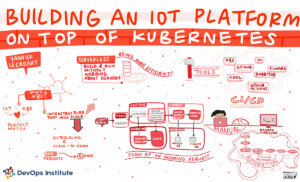
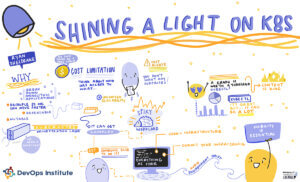
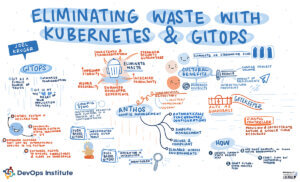
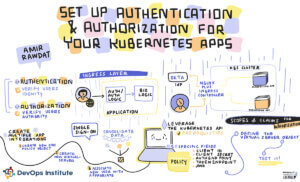
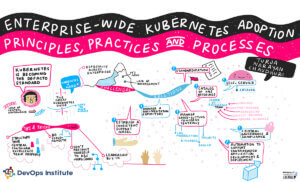
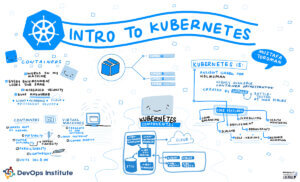
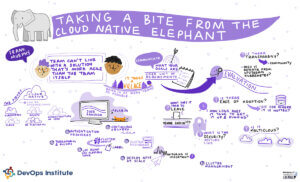
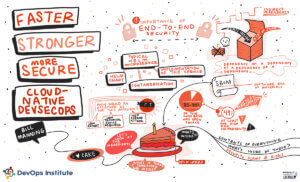
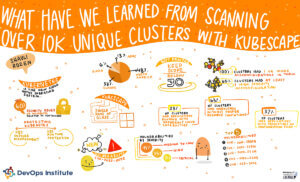
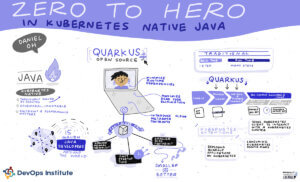

![[EP112] Why an AIOps Certification is Something You Should Think About](https://www.devopsinstitute.com/wp-content/uploads/2022/01/DOI-Human-DevOps-Digital-Podcast-Screen-600x600px-400x250.jpg)

